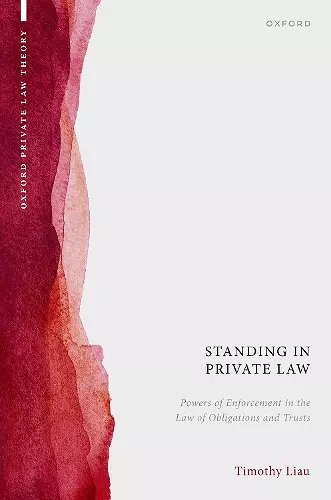Standing in Private Law
Powers of Enforcement in the Law of Obligations and Trusts
Format:Hardback
Publisher:Oxford University Press
Published:21st Jul '23
Currently unavailable, and unfortunately no date known when it will be back

Standing in Private Law: Powers of Enforcement in the Law of Obligations and Trusts develops the idea that we should attend more to 'standing', conceived as a power to hold another accountable before a court as a distinct private law concept. Prominent lawyers have claimed that private law does not have or need standing rules, yet this seems implausible. If private law is obligation-imposing, we need rules about who can sue on these obligations to hold their bearers accountable. This book argues that a reason why standing has been relatively overlooked and under-conceptualized, receiving meagre attention from private lawyers, is because it has been obscured from plain sight: it has been swallowed up by the more dominant and capacious concept of a 'right'. However, standing is a distinct and separable private law concept that can and should be distinguished more clearly from 'right'. Doing so is necessary for the continued rational development of private law doctrine. It is also necessary for a deeper theoretical understanding of standing's significance, and its place within the remedial apparatus of private law. This book argues that an implicit standing rule exists across the law of obligations. It examines its justifiability, and the justifiability of exceptions to the rule. It also shows how and why recognising standing's distinctiveness can help us to interpret, develop, and resolve debates within different areas of private law, including the laws of contract, torts, unjust enrichments, and relatedly, the law of trusts.
Standing in Private Law is a ground-breaking work, shining a light upon the neglected private law standing rules and urging a clarity of thought from which the developed public law standing rules might also benefit. It is a work of deep theory, building upon the writing of some of the great legal theorists of the 20th and 21st centuries...The understanding that Dr Liau encourages will have significant effects on private law legal doctrine. * The Hon James Edelman, Justice of the High Court of Australia *
This is not a voluminous book. However, each chapter is packed with in-depth analysis of theories and doctrines...This book might be best placed in an academic setting. * Law Society Gazette *
In a remarkable book full of insights for both familiar and new problems, Dr Liau meticulously unpacks the concept of standing in private law, distinguishing it from adjacent concepts which could obscure it from view, and shows how recognising standing as a distinct private law concept can help us understand, illuminate, and perhaps even resolve debates and difficulties in private law doctrine...despite the 'deep theory' the themes and arguments of the book are undoubtedly also relevant for those wrestling with problems in the very practical world of banking and financial law. They will find many insights within its pages. All need this excellent book on their bookshelf should the issues it discusses arise. * Sir Ross Cranston KC FBA, Butterworths Journal of International Banking and Financial Law *
The novelty and ambition of Standing in Private Law truly shines - in forcing us to interrogate and clarify a term which has been used all too infrequently and all too imprecisely. To conclude with one final sense of 'standing': Standing in Private Law certainly stands out as a rigorous and rich contribution to an area of private law which has long awaited such a work. * The Cambridge Law Journal *
That Standing in Private Law prompts these kinds of questions is, as I see it, a testament to its quality: it is what one expects genre-defining work to do. In a book launch earlier this year, one commentator remarked that Liau had, with this monograph, essentially "invented a new field". I doubt this is an overstatement. Standing in Private Law is a remarkable piece of work. It is elegant and erudite, and sure to enrich - or at least agitate - its reader's view of private law and its role within common law legal systems. * Marcus Teo, Singapore Journal of Legal Studies *
- Winner of Winner, Peter Birks Prize for outstanding early career scholarship, Society of Legal Scholars.
ISBN: 9780192869661
Dimensions: 240mm x 165mm x 25mm
Weight: 666g
368 pages